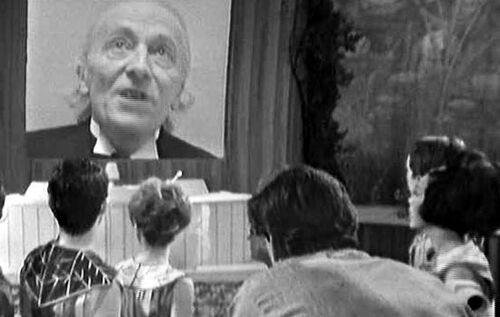Transmat:Doctor Who: Difference between revisions
No edit summary |
No edit summary |
||
| Line 14: | Line 14: | ||
<div class="tr-box five">The careers of the [[Fifth Doctor|Fifth]], [[Sixth Doctor|Sixth]], [[Seventh Doctor|Seventh]] and [[Eighth Doctor]]s are '''significantly''' longer [[Big Finish Doctor Who audio stories|in audio]] than on television.</div> | <div class="tr-box five">The careers of the [[Fifth Doctor|Fifth]], [[Sixth Doctor|Sixth]], [[Seventh Doctor|Seventh]] and [[Eighth Doctor]]s are '''significantly''' longer [[Big Finish Doctor Who audio stories|in audio]] than on television.</div> | ||
<div class="tr-box six">Officially, only ''[[The Lodger (TV story)|The Lodger]]'' has been explicitly adapted from a comic strip — also called [[The Lodger (comic story)|The Lodger]]''. | <div class="tr-box six">Officially, only ''[[The Lodger (TV story)|The Lodger]]'' has been explicitly adapted from a comic strip — also called [[The Lodger (comic story)|The Lodger]]''. | ||
[[File:10MickeyFootball.png|center|250px]] | [[File:10MickeyFootball.png|center|250px|link=The Lodger (comic story)]] | ||
However, several stories have clearly taken material from comic strips — often those in ''[[Doctor Who Magazine]]''. ''[[The Shakespeare Code (TV story)|The Shakespeare Code]]'' contains a good amount of material from ''[[A Groatsworth of Wit (comic story)|A Groatsworth of Wit]]'', and the notion of the Doctor absorbing the [[time vortex]] in order to spare a [[companion]] was explored in both ''[[The Parting of the Ways (TV story)|The Parting of the Ways]]'' and ''[[The Flood (comic story)|The Flood]]''. </div> | However, several stories have clearly taken material from comic strips — often those in ''[[Doctor Who Magazine]]''. ''[[The Shakespeare Code (TV story)|The Shakespeare Code]]'' contains a good amount of material from ''[[A Groatsworth of Wit (comic story)|A Groatsworth of Wit]]'', and the notion of the Doctor absorbing the [[time vortex]] in order to spare a [[companion]] was explored in both ''[[The Parting of the Ways (TV story)|The Parting of the Ways]]'' and ''[[The Flood (comic story)|The Flood]]''. </div> | ||
</div> | </div> | ||
Revision as of 11:34, 8 October 2013
Playback was a television production technique in which pre-recorded material was literally played into a scene, rather than being added as a post-production effect. It was universally used in the 1960s as the method by which actors were seen on view screens. As seen in the picture at the left, William Hartnell was pre-recorded separately, then projected live into the scene with the actors in the foreground. Though antiquated, the technique was used even into the 1980s, most notably for the title sequence. The quality of the opening titles for the 1963 version of Doctor Who was never high, because it was never a first-generation copy of the titles. Instead, they were played live into the recording of the first scene of many episodes, causing actors to have to time their first lines to the final notes of the studio-audible Doctor Who theme.
Jane Tranter was an important advocate for the return of Doctor Who to BBC One in the early 2000s.
Today in production history
- 1964 - "Flashpoint" was recorded at Riverside Studios 1, bringing Carole Ann Ford's tenure on Doctor Who to a close. (INFO: The Daleks Invasion of Earth)
- 1969 - Location filming for Spearhead from Space took place. (REF: Doctor Who The Handbook: The Third Doctor)
- 1970 - Studio filming for Terror of the Autons took place at BBC Television Centre 8. (REF: Doctor Who The Handbook: The Third Doctor)
- 1984 - Location filming for The Mark of the Rani took place. (REF: Doctor Who The Handbook: The Sixth Doctor)
- 1999 - The Big Finish audio story The Marian Conspiracy was recorded.
- 2008 - Big Finish's two-part audio story The Eight Truths / Worldwide Web was recorded at the Moat Studios.
- 2009 - The Big Finish audio story Echoes of Grey was recorded at the Moat Studios.
- 2012 - The second series of Big Finish's Doctor Who spin-off Counter-Measures was recorded at the Moat Studios.
- 2014 - Big Finish's audio anthology The Third Doctor Adventures was recorded at the Moat Studios.
- 2017 - Big Finish announced the Short Trips audio story Landbound.
- 2018
- The Big Finish audio story The Monsters of Gokroth was recorded at the Moat Studios.
- Big Finish's Rose Tyler audio drama anthology The Dimension Cannon was recorded.
- 2023 - Series 15 began filming.
Today's releases
- 1965
- "Small Prophet, Quick Return" premiered on BBC1.
- Part one of the TV Century 21 comic story The Menace of the Monstrons was published.
- 1971 - Part four of Backtime was published in Countdown.
- 1976
- Part four of The Hand of Fear premiered on BBC1.
- Part six of the TV Comic story The Mutant Strain was published.
- 1997 - DWM 258 was published by Marvel Comics.
- 2006 - Jack's Back and Bad Day at the Office premiered on BBC Three.
- 2008 - DWA 87 was published by BBC Magazines.
- 2009 - Part two of The Mad Woman in the Attic premiered on CBBC.
- 2012 - UNIT Dominion was released by Big Finish.
- 2013
- The Light at the End was released by Big Finish Productions.
- The Mystery of the Haunted Cottage was published by Puffin Books.
- DWA 332 was published by Immediate Media Company London Limited.
- 2014
- 12 Doctors, 12 Stories was published by Puffin Books, including the short story Lights Out, which was also digitally published independently of the anthology.
- DWFC 31 was published by Eaglemoss Collections.
- 2015
- 12 Doctors, 12 Stories was published by Penguin Group.
- Toby Hadoke's Who's Round 143 was released online.
- 2018 - Torchwood: God Among Us 1 was released by Big Finish.
- 2019 - Smashed was released by Big Finish.
- 2022 - The Power of the Doctor premiered on BBC One.
Today's births and deaths
- 1925 - Actor Glyn Houston was born.[1]
- 1928 - Actor Jerome Willis was born.[2]
- 1955 - Actor Annie Hulley was born.[3]
- 1969 - Writer Trudi Canavan was born.[4]
- 1998 - Actor Christopher Gable died.[5]
- 2010 - Actor Lewis Alexander died.[6]


